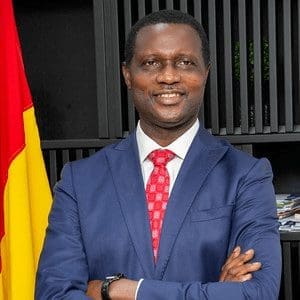Dr. Yaw Osei Adutwum is staking his New Patriotic Party presidential bid on an ambitious education vision: making university tuition free for all Ghanaians. Speaking to party delegates during his campaign for the January 31, 2026 NPP primary, the former Education Minister declared that tertiary education should become a right, not a privilege defined by family wealth.
“Education is the greatest equaliser, and no Ghanaian child should be denied the opportunity to attend university simply because of poverty,” Adutwum told delegates. His commitment directly builds on his track record as Minister, where he championed science, technology, engineering, and mathematics expansion across Ghana’s secondary schools through the Free SHS policy that began in 2017.
The proposal represents a significant step beyond the government’s current free tertiary tuition initiative. President John Mahama’s administration has already allocated GH¢452.9 million to cover academic facility user fees for 156,294 first-year students in the 2025 academic year, yet Adutwum promises a more comprehensive approach addressing all university students, not only freshers.
The scale of Adutwum’s ambition becomes clear when examining implementation logistics. Haruna Iddrisu, Minister-designate of Education, announced that approximately GH¢345 million would be required to fully implement free tuition for first-year university students alone, drawing funds from efficient resource allocation, improved revenue mobilisation, and private sector partnerships according to Adutwum’s framework.
Adutwum plans a phased rollout starting with public universities and prioritising STEM programmes, fields the country desperately needs as it pursues economic transformation. Yet his proposal faces real questions about sustainability that have haunted previous education expansion policies.
Ghana’s Free SHS programme demonstrates both the promise and the strain of bold education policies. Since the policy’s launch, implementation revealed that high enrolment rates culminated in teacher shortages, increased workload for existing teachers, classroom deficits, overcrowding in class, high rate of indiscipline and inadequate teaching and learning materials. Infrastructure remained stretched despite the policy’s undisputed success in removing financial barriers for thousands of families.
At the tertiary level, challenges differ but prove equally complex. At public universities, students are admitted as either regular or fee-paying students, with regular students benefiting from lower tuition fees through government subsidies, while fee-paying students who do not meet competitive admission criteria must pay higher tuition fees. Universalising free tuition would upend this dual system, raising questions about admission standards and resource distribution.
One critical concern centres on funding sustainability. Minister Haruna Iddrisu has called for a portion of Ghana’s oil revenue to be dedicated to the free tertiary policy, proposing that 2.5 per cent of the country’s oil revenue be channelled into scholarships and bursaries to guarantee the policy’s long-term viability, arguing that the Ghana Education Trust Fund alone cannot sustain the initiative.
Adutwum’s timing matters politically. The NPP presidential primary scheduled for January 31, 2026 features five distinguished candidates: Kwabena Adjei Agyepong, Kennedy Ohene Agyapong, Dr Bryan Acheampong, Dr Mahamudu Bawumia, and Adutwum himself. Education policy resonates strongly with Ghanaian voters, and Adutwum’s credential as former Education Minister distinguishes his candidacy against rivals without that portfolio experience.
Yet polling data from September 2025 placed Dr. Bawumia at 57 per cent preference among NPP voters, with Kennedy Agyapong at 29 per cent, while Adutwum and Dr. Bryan Acheampong polled 6 per cent and 5 per cent respectively. The former Vice President maintains commanding lead as the race approaches its climactic vote.
Adutwum’s education vision echoes the Free SHS legacy he helped architect. That policy fundamentally reshaped secondary education access across Ghana, enrolling unprecedented numbers of students in public schools. Yet managing that expansion tested government resources, particularly in rural areas where infrastructure lagged demand.
Extending free tuition to universities would represent policy boldness matching or exceeding the Free SHS ambition. The question remains whether Ghana’s fiscal capacity can absorb such expansion without compromising educational quality through overcrowding and resource scarcity that already characterised secondary school implementation challenges.
The delegates deciding this race on January 31 will ultimately weigh Adutwum’s transformational vision against the practical constraints that have complicated previous education initiatives. His message resonates with voters prioritising educational access. Whether it translates into party support at the primary may depend on how convincingly he addresses the implementation questions that policy experts and education administrators continue raising about free university education’s long-term viability.
Source: newsghana.com.gh











